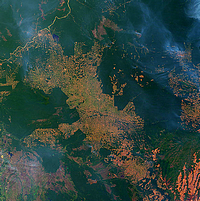This is Part II in a four-part series. Part I examined the follow-up agreement to the Kyoto Protocol. Part II examines the REDD+ agreement. Part III will examine financial assistance. And Part IV will examine technology transfers and adaptation.
CANCÚN, Mexico -- Amid all the discussion of global warming and how the international community can deal with it, the term "REDD +" was a particular focus of attention at December's Cancún conference on climate change. The initiative stands out as the newest, but perhaps the least-tested and least-understood method to reduce global carbon emissions and abate rising temperatures. If the moderately successful Cancún agreement actually results in follow-up action, 2011 will be the year of REDD.
REDD, which stands for the Reduction of Emission from Deforestation and Forest Degradation, has been around as a proposal for less than a decade. The "plus sign" was added in recent years to account for the fact that protecting other ecosystems besides forests -- in particular peatlands and bogs, which release huge amounts of carbon and methane when upturned, burned or otherwise destroyed -- will be just as essential to achieving real drops in atmospheric CO2 levels.

